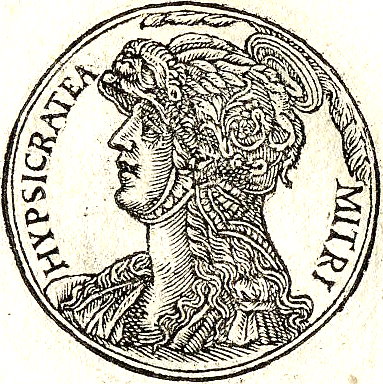Hypsicratea on:
[Wikipedia]
[Google]
[Amazon]
 Hypsicratea or Hypsikrateia (flourished 63 BC), was the concubine, and perhaps wife, of King
Hypsicratea or Hypsikrateia (flourished 63 BC), was the concubine, and perhaps wife, of King
32.8
* Valerius Maximus, ''Factorum et dictorum memorabilium libri''
 Hypsicratea or Hypsikrateia (flourished 63 BC), was the concubine, and perhaps wife, of King
Hypsicratea or Hypsikrateia (flourished 63 BC), was the concubine, and perhaps wife, of King Mithridates VI of Pontus
Mithridates or Mithradates VI Eupator ( grc-gre, Μιθραδάτης; 135–63 BC) was ruler of the Kingdom of Pontus in northern Anatolia from 120 to 63 BC, and one of the Roman Republic's most formidable and determined opponents. He was an e ...
.
Life
Nothing is known of the family background of Hypsicratea, although it has been noted that her name suggests that her family came from theCimmerian Bosporus
The Kerch Strait, uk, Керченська протока, crh, Keriç boğazı, ady, Хы ТӀуалэ is a strait in Eastern Europe. It connects the Black Sea and the Sea of Azov, separating the Kerch Peninsula of Crimea in the west fr ...
. All the information about her relates to the final years of Mithridates' reign.
Hypsicratea accompanied Mithridates during his escape around the east coast of the Black Sea
The Black Sea is a marginal mediterranean sea of the Atlantic Ocean lying between Europe and Asia, east of the Balkans, south of the East European Plain, west of the Caucasus, and north of Anatolia. It is bounded by Bulgaria, Georgia, Roma ...
, following his final defeat by Pompey
Gnaeus Pompeius Magnus (; 29 September 106 BC – 28 September 48 BC), known in English as Pompey or Pompey the Great, was a leading Roman general and statesman. He played a significant role in the transformation of ...
in 66 B.C. She probably died during an uprising in Phanagoria
Phanagoria ( grc, Φαναγόρεια, Phanagóreia; russian: Фанагория, translit=Fanagoriya) was the largest ancient Greek city on the Taman peninsula, spread over two plateaus along the eastern shore of the Cimmerian Bosporus.
The ci ...
in 63 B.C.
After Mithridates' defeat, Hypsicratea broke free of Pompey's blockade and while the rest dispersed she was one of only three who remained by the King's side. Plutarch
Plutarch (; grc-gre, Πλούταρχος, ''Ploútarchos''; ; – after AD 119) was a Greek Middle Platonist philosopher, historian, biographer, essayist, and priest at the Temple of Apollo in Delphi. He is known primarily for his ''P ...
wrote that she was:
:''"...always manly (androdes) and extremely bold, the king consequently liked to call her Hypsicrates. At that time taking possession of a cloak and horse of a Persian
Persian may refer to:
* People and things from Iran, historically called ''Persia'' in the English language
** Persians, the majority ethnic group in Iran, not to be conflated with the Iranic peoples
** Persian language, an Iranian language of the ...
man she neither flagged in body before the distances they ran nor did she weary of tending the body and horse of the king, until they came to a place called Sinor, which was full of the king's coins and treasures."''
Valerius Maximus
Valerius Maximus () was a 1st-century Latin writer and author of a collection of historical anecdotes: ''Factorum ac dictorum memorabilium libri IX'' ("Nine books of memorable deeds and sayings", also known as ''De factis dictisque memorabilibus'' ...
reports:
:''"The Queen Hypsicratea too loved her husband Mithradates, with all the stops of affection let out, and for his sake she thought it a pleasure to change the outstanding splendor of her beauty for a masculine style. For she cut her hair and habituated herself to horse and arms, so that she might more easily participate in his tools and danger. Indeed when he was defeated by Cn. Pompey, and fleeing through wild peoples, she followed him with body and soul equally indefatigable. Her extraordinary fidelity was for Mithridates his greatest solace and most pleasant comfort in those bitter and difficult conditions, for he considered that he was wandering with house and home because his wife was in exile along with him."''
Epitaph
In 2004, a briefepitaph
An epitaph (; ) is a short text honoring a deceased person. Strictly speaking, it refers to text that is inscribed on a tombstone or plaque, but it may also be used in a figurative sense. Some epitaphs are specified by the person themselves be ...
of Hypsicratea was discovered by archaeologists in Phanagoria
Phanagoria ( grc, Φαναγόρεια, Phanagóreia; russian: Фанагория, translit=Fanagoriya) was the largest ancient Greek city on the Taman peninsula, spread over two plateaus along the eastern shore of the Cimmerian Bosporus.
The ci ...
. The epitaph uses the masculine version of her name, Hypsicrates - thus confirming what Plutarch
Plutarch (; grc-gre, Πλούταρχος, ''Ploútarchos''; ; – after AD 119) was a Greek Middle Platonist philosopher, historian, biographer, essayist, and priest at the Temple of Apollo in Delphi. He is known primarily for his ''P ...
said about her. It calls her "wife of King Mithridates Eupator Dionysos."
The epitaph was inscribed on a block of marble, which formed part of the base of a bronze statue of Hypsicratea. The statue has not survived, and it is impossible to know how it depicted her.Facella (2017), p. 115.
References
Sources
* Plutarch, ''Life of Pompey''32.8
* Valerius Maximus, ''Factorum et dictorum memorabilium libri''
Bibliography
* * * * * *{{cite book , last1=Yarrow , first1=Liv Mariah , title=Roman Republic to 49 BCE : using coins as sources. , date=2021 , publisher=Cambridge University Press , location=Cambridge , isbn=9781107013735 , page=77 2nd-century BC women 1st-century BC women Women in Hellenistic warfare Queens of Pontus People of Caucasus descent Mithridatic dynasty